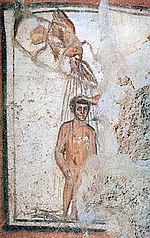Batisme
Lo batisme[2], bateg, la batejada (var. bat(e)iada), batejalha, batialha (var. batielha auv.), lo batejament, batejat, batesme o la batesma (e batiau/batiòu en gascon) (del grèc βαπτίζω baptizo: «immersion», «far d'ablucions»)[3] es un acte ritual crestian, amb utilizacion d'aiga, per lo qual una persona es admesa coma sòci de la Glèisa[4].

Jèsus se meteis foguèt batejat.[5] La forma usuala del baptisme entre los primièrs crestians èra per lo candidat d'èsser banhat totalament o parcialament[6][7][8][9][10]. Mentre que Joan Baptista fasiá servir un riu prigond per son baptisme, çò que suggerís una immersion,[11] las pròvas iconologicas e arqueologicas del baptisme crestian dempuèi lo sègle III indican que la forma normala èra de versar d'aiga subre la part nauta del còs de la persona que se teniá quilhada dins lo riu[12][13][14][15]. Una autra forma comuna de batisme es de versar d'aiga tres còps subre lo front de la persona.

Nòtas e referéncias
modificar- ↑ Cal notar qu'es un imatge de batisme per versament d'aiga subre lo front, diferent del baptisme per immersion jos l'aiga. Aqueste mòde de baptisme contunha d'èsser utilizat dins los païses de l'èst, levat pels mainatges, mas a l'oèst foguèt abandonat cap al sègle XV, e l'artista pòt aver causit una forma arcaïca per pintar lo batisme de Sant Pèire.
- ↑ Loís Alibèrt, qu'esita dens los mots cultes entre lo tipe Bat- e lo tipe Bapt-: vejatz lo son diccionari («batisme», «batistèri», p. 149) e la soa gramatica («baptisme», «Baptista», p. 421). Josiana Ubaud que guarda sonque “batisme” shens p.
- ↑ Modèl:Cite encyclopedia
- ↑ "A travèrs del baptisme sèm desliurats del pecat e tornam nàisser coma filh de Dieu; Venèm sòcis del Crist, sèm incorporats dins la Glèisa e partejam sa mission" (Catechism of the Catholic Church, 1213;] "Holy Baptism is the sacrament by which God adopts us as his children and makes us members of Christ's Body, the Church, and inheritors of the kingdom of God" (Book of Common Prayer, 1979, Episcopal ); "Baptism is the sacrament of initiation and incorporation into the body of Christ" (An United Methodist Understanding of Baptism); "As an initiatory rite into membership of the Family of God, baptismal candidates are symbolically purified or washed as their sins have been forgiven and washed away" (William H. Brackney, Believer's Baptism).
- ↑ Modèl:Bibleref2, Modèl:Bibleref2, Modèl:Bibleref2
- ↑ «Baptism».
- ↑ Baptism.
- ↑ «Roman Catholicism: Baptism».
- ↑ Living Water, Sealing Spirit: Readings on Christian Initiation. Maxwell E. Johnson. ISBN 0-8146-6140-8. OCLC 31610445.
- ↑ International Standard Bible Encyclopedia: A-D. Geoffrey W. Bromiley. ISBN 0-8028-3781-6. OCLC 50333603.
- ↑ The Gospel of Matthew. ISBN 0-8028-2501-X. OCLC 122701585.
- ↑ «The Archæology of the Mode of Baptism».
- ↑ Mentre que in some places and in certain circumstances total immersion very likely was practiced, all the evidence (and there is much more) points to baptism in most cases by partial immersion, or affusion (dunking of the head or pouring water over the head, typically when the baptizand was standing in the baptismal pool). Here the words of St. John Chrysostom might be noted: "It is as in a tomb that we immerse our heads in the water… then when we lift our heads back the new man comes forth" (On John 25.2, PG 59:151). In a word, while early Christians were very attentive to symbolism relating to baptism (cf. the funerary shape of the baptistry building; the steps, typically three, for descending and rising from the font; the iconography relating to regeneration, etc.), they show few signs of preoccupation with total immersion. (Father John Erickson in St Vladimir's Theological Quarterly, 41, 77 (1997), quoted in The Byzantine Forum)
- ↑ The Westminster handbook to patristic theology. ISBN 0-664-22396-6. OCLC 52858567.
- ↑ {{{títol}}}. ISBN 0-19-866242-4. OCLC 60181672.Modèl:Pn